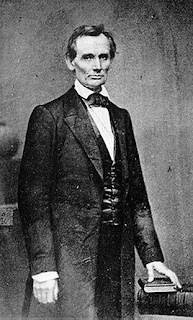In early 1860,
Abraham Lincoln was a little known regional politician from Springfield,
Illinois. The Republican Party was new, and had failed running national hero
John C. Frémont for president in 1856. Abraham Lincoln chances of ascending to
the presidency under the Republican banner were slight. All that changed in New
York City on February 27, 1860. That afternoon, Lincoln had his photograph
taken by Mathew Brady, and in the evening, he gave a historic speech at the
Cooper Union. Lincoln often said that Brady’s photograph and his Cooper Union
address propelled him to the presidency.
Below is a highly abridged
version of Lincoln’s speech.
“We hear that you
will not abide the election of a Republican president! In that event, you say
you will destroy the Union; and then, you say, the great crime of having
destroyed it will be upon us!
“That is cool. A
highwayman holds a pistol to my ear, and mutters through his teeth, ‘Stand and
deliver, or I shall kill you and then you will be a murderer!’
“What the robber
demands of me—my money—is my own; and I have a clear right to keep it; but my
vote is also my own; and the threat of death to me to extort my money and the
threat to destroy the Union to extort my vote can scarcely be distinguished.”
“What will convince
slaveholders that we do not threaten their property? This and this only: cease
to call slavery wrong and join them in calling it right. Silence alone will not
be tolerated—we must place ourselves avowedly with them. We must suppress all
declarations that slavery is wrong, whether made in politics, in presses, in
pulpits, or in private. We must arrest and return their fugitive slaves with
greedy pleasure. The whole atmosphere must be disinfected from all taint of
opposition to slavery before they will cease to believe that all their troubles
proceed from us.
“All they ask, we
can grant, if we think slavery right. All we ask, they can grant if they think
it wrong.
“Right and wrong is
the precise fact upon which depends the whole controversy.
“Thinking it wrong,
as we do, can we yield? Can we cast our votes with their view and against our
own? In view of our moral, social, and political responsibilities, can we do
this?”
The hall burst with
repeated shouts of “No! No!”
“Let us not grope
for some middle ground between right and wrong. Let us not search in vain for a
policy of don’t care on a question about which we do care. Nor let us be
frightened by threats of destruction to the government.”
Prolonged applause
kept Lincoln silent for several minutes before delivering his final sentence.
“Let us have faith
that right makes might, and in that faith, let us, to the end, dare to do our
duty as we understand it!”
When Lincoln stepped
back from the podium after this dramatic conclusion, the Cooper Union Great
Hall exploded with noise and motion. Everybody stood. The staid New York
audience cheered, clapped, and stomped their feet. Many waved handkerchiefs and
hats.
If you want to see
how a principled politician gained national repute with honor and integrity, I recommend Lincoln at Cooper Union by Harold Holzer. You might also enjoy the Lincoln historical theme I used in my contemporary thriller, The Shut Mouth Society.




